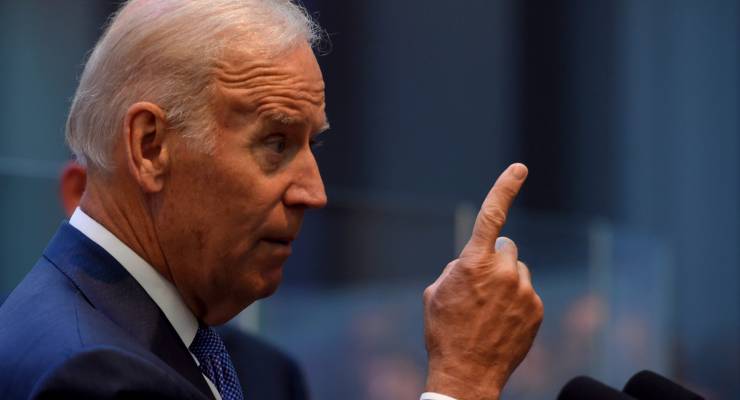
When Joe Biden announced his candidacy for president of the United States in April 2019, he proclaimed it a “battle for the soul of this nation”. After four years of division, disruption and discord, he declared “everything that has made America is at stake”. It was a recurring theme that drove his march to the White House.
But as he takes the oath of office on January 20 Biden will inherit a crisis trifecta that nobody could have predicted two years ago.
Foremost is a COVID-19 pandemic that has killed more than 350,000 Americans and inflicted chronic ailments upon millions more.
In tandem is the economic havoc that has shadowed the disease and, like that mercurial virus, devastated countless lives while leaving others unscathed.
Alongside these two national emergencies, and reinforced by both, is the reckoning unleashed after the public homicide of George Floyd by Minneapolis police. Captured on a bystander’s phone and streamed to the world, it sparked a spontaneous global uprising against racism and systemic injustice.
Meanwhile the remorseless encroachment of climate change continues unabated. The scale of potential upheaval that it ushers has so far overwhelmed our institutional capacity and political will to respond decisively. But the clock keeps ticking.
How should Biden meet this moment?
First, Biden is an institutionalist. Elected to the US Senate at just 29, he has served in public office longer than any prior commander-in-chief. He reveres the constitution and the equal branches of government it established.
During his tenure as a senator and then vice-president to Barack Obama, he prided himself on his collegiality and ability to work with colleagues of all political persuasions. He has repeatedly insisted that he intends to bridge the partisan rancour by reaching across the aisle to agree solutions for America’s most urgent challenges.
His confidence that he can restore this comity is not shared by many of his fellow Democrats. They fear his optimism is naive, and that the gauzy memories he harbours are redundant in today’s fractured polity.
They recall Senator Mitch McConnell’s conduct during the Obama administration, underscored by the vow he made to make Obama a one-term president. Although he failed in this objective, McConnell and his Republican colleagues spent eight years resisting and obstructing every substantive Obama initiative, including overhauls of malfunctioning healthcare and immigration systems, financial oversight and judicial appointments.
He took a last resort tool of Senate custom, the filibuster, and weaponised it into a super-majority roadblock to reform. He didn’t win every battle, but his relentless opposition did much to stall Obama’s agenda and set the stage for a populist backlash in 2016.
McConnell may be a Machiavellian caricature, but he is no fool. A master of parliamentary procedure, he is one of the most skilled legislative tacticians in American history. He also knows that the public does not follow the arcane detail of Beltway politics. The big picture is all that registers with most voters.
Biden had a front-row seat to McConnell’s intransigence. As vice-president, he often served as Obama’s envoy to Capitol Hill. It was a role he willingly embraced, having served six terms in Congress’s upper chamber. By all accounts, Biden and McConnell have mutual respect and are able to deal openly with one another.
This is not the same as negotiating in good faith. In his latest book, A Promised Land, Barack Obama recounts McConnell’s reaction to the merits of a proposed bill: “You must be under the mistaken impression that I care.”
He defied history and convention with his glum obstinacy and weasel words logic to the public. He paid no price for this hindrance. To the contrary, Donald Trump’s unexpected triumph allowed the GOP to pack the court with three new justices during his term. Legal analysts believe they may prove to be the most conservative bench since the 1930s.
Biden should not yield to this obduracy. He should trust that good policy makes good politics, and be bold in his ambition.
He can seek inspiration from the titan of Democratic presidents — Franklin Delano Roosevelt. Like Biden, FDR took the helm during an existential crisis. When he moved into the White House in 1933, the Great Depression had been raging for more than three years. Unemployment had swelled to 25%. GDP had plunged by 30% and industrial output had almost halved.
There was no government safety net. His predecessor, Herbert Hoover, resisted unemployment aid and inflicted tariff increases, measures that only compounded the catastrophe.
Roosevelt’s first action was to declare a nationwide bank holiday, closing all banks to halt the panic and restore confidence. Congress passed the Emergency Banking Act to regulate gold flows. He explained to the American people the logic of his decision and outlined the steps he would take to safeguard their money. When banks reopened, deposits exceeded withdrawals and the sharemarket soared. The panic was over.
Roosevelt moved swiftly to implement his promises. He established the National Recovery Administration, the Tennessee Valley Authority, and the Civilian Conservation Corps to create jobs and stimulate the economy. The Securities Act of 1933 was passed to regulate share sales, and the Securities and Exchange Commission was formed to enforce it. In 1935 he introduced social security, and expanded labour market intervention with the Works Progress Administration and the National Labor Relations Board.
The passage of time has obscured the bitter opposition Roosevelt faced to all these initiatives. The Supreme Court ruled against 11 of his alphabet laws — ;nicknamed for the initials of the new agencies they created — ;to block his New Deal agenda. Republicans bleated that the wealthy patrician president was a class traitor and a socialist. FDR stood firm and defiant.
He denounced his critics in a public address: “We know now that government by organised money is just as dangerous as government by organised mob. Never before in all our history have these forces been so united against one candidate as they stand today. ;They are unanimous in their hate for me — and I welcome their hatred.”
Of course FDR was greatly assisted by having won large Democratic majorities in both the House and Senate. What is not well remembered is that FDR expanded his majority in both chambers in both the 1934 midterm elections and the 1936 general election. In 1936 he won reelection in an even bigger landslide than 1932. His 98.5% share of the Electoral College vote remains the largest secured in 200 years.
What then are the lessons for Biden? His party holds a bare majority in the House of Representatives. In the Senate, Democrats have been pinning their hopes on twin run-off races for Georgia’s two Senate seats. With the victories of Raphael Warnock and Jon Ossoff, the Senate will be balanced at 50 members apiece for both parties, which will leave Kamala Harris with the tiebreaking vote as vice-president.
This will give Biden a crucial boost by enabling confirmation of cabinet and judicial nominees, control of Senate committees, and opening the door to a backlog of new laws.
However, legislation is not his only option. Biden holds key advantages that FDR could only dream of. The American government has evolved beyond recognition over the past century.
The size and scope of the executive branch dwarfs what Roosevelt had at his disposal, in part due to reforms that FDR began. Biden’s ability to enforce existing laws and regulations, set policy priorities, and appoint personnel to execute them will be critical to steering the US during his administration.
Indeed this was the most effective feature of Trump’s regime. Congress enacted little meaningful legislation, yet Trump was still able to impose his will on the government and the nation. His liberal use of executive orders, previously decried by Republicans as presidential overreach, will not have gone unnoticed. While Biden has repeatedly demurred on his willingness to bypass Congress and rule by fiat, he is not about to unilaterally disarm.
FDR also showed the benefits of communicating directly with the public. His fireside chats became a regular channel to explain his decisions to Americans and secure their support. Trump deployed a similar technique, albeit via cable news and Twitter. It proved extremely effective in enabling him to bypass established media and appeal directly to voters. Although Biden has pledged not to govern by tweet, he understands that using modern outlets is essential for his success.
Biden shares another quality that steeled FDR’s resolve: boundless empathy. FDR developed his after being paralysed in adulthood by polio. It gave him insight into the hardship and suffering of others, and girded his conviction to wield the power of government to improve their lives. Biden has known torment too, having endured ridicule and shame from a pronounced stutter as a boy, as well as having buried his first wife and two children.
Perhaps Biden’s most potent weapon is least recognised. Throughout his career he has been routinely underestimated, and has repeatedly surprised his detractors. Nobody lands in the US Senate by happenstance, least of all at just 29.
In 1972, with no money to campaign and trailing 30 points in the polls, Biden faced a two-term veteran Republican senator. With nothing but energy, enthusiasm and emotional connection, he notched an upset win despite Richard Nixon winning a second presidential term in a landslide.
All these years later, Biden was mostly written off by pundits after finishing fourth in the 2020 Iowa Democrat caucuses and fifth in the New Hampshire primary. They were wrong. Buoyed by a strategically timed endorsement from House majority whip Jim Clyburn, Biden stormed to victory in the South Carolina primary and never looked back.
Nonetheless, many Democrats are wary that Biden’s bipartisan mindset will yield tepid results in lieu of audacious reform. Ally this with the return of many Obama administration veterans to leading roles in his team, and alarm bells are ringing.
Democrats should pause their infighting. There’s a reason Trump feared Biden most. His instincts alerted him to Biden’s potency.
Biden will face an avalanche of issues from day one. If there’s one thing we should have learnt these past four years, it’s that the political playbook has been torn up. Biden should seize the initiative to write a new one.
Multiple crises demand bold leadership. Caution and moderation are no panacea. Biden should follow FDR’s lead and swing for the fences. He has little to lose.
History never rewards timidity. Voters don’t either.








The good burgher conservatives in the US still have a raging hatred of FDR’s ‘socialism’. Starvation is obviously preferable in US culture to any form of communalism. (Right to Life, anyone?)
The popular ‘Little House on the Prairie’ books were written as anti-government propaganda by Rose Wilder Lane, who was disgusted by FDR’s socialistic government programs and spun a myth of proud, self-sufficient, isolated families standing on their own efforts without any help from others or the government. It’s all BS, of course. The ‘rugged individualists’ who settled the West did it with massive government assistance and with the help of friends, neighbours and community.
Biden’s opponents are probably even more ferally divorced from reality than FDR’s.
A real Z list of writers today despite the abundance of material.
Rundle’s piece was by-the-numbers, “typing not writing“.
Will the adult staff be back next week?
“Good policy makes good politics”
Yep. That’s why Tony Abbott’s Axe The Tax garbage failed in 2013. It’s also why Scotty from marketing didn’t get his miracle in 2019- he didn’t have any policies at all!